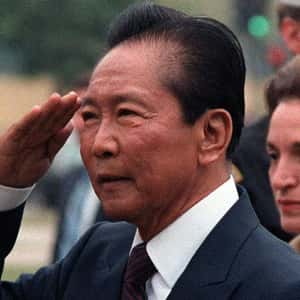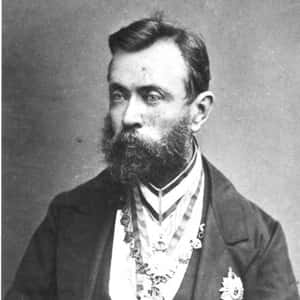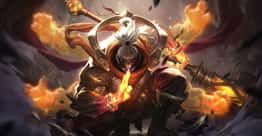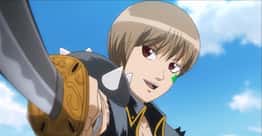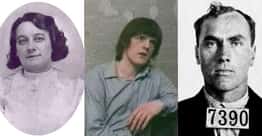Famous People Named Ferdinand
Who knew there were so many famous people named Ferdinand in the world? Our list of celebrities named Ferdinand includes pictures and information about each person when available, so you can get to know them a little better if you don't know them. The famous Ferdinands below come from all walks of life, but all ended up achieving fame or notoriety in one way or another. This list includes singers named Ferdinand, actors named Ferdinand, and much more. Ferdinand Marcos, Ferdinand Magellan, and Ferdinand de Saussure are only a few of the well-known people named Ferdinand on this list.
- Politician, Soldier, LawyerFerdinand Emmanuel Edralin Marcos Sr. (September 11, 1917 – September 28, 1989) was a Filipino politician and kleptocrat who was the tenth President of the Philippines from 1965 to 1986. A leading member of the far-right New Society Movement, he ruled as a dictator under martial law from 1972 until 1981. His regime was infamous for its corruption, extravagance, and brutality.Marcos claimed an active part in World War II, including fighting alongside the Americans in the Bataan Death March and being the "most decorated war hero in the Philippines". A number of his claims were found to be false and the United States Army documents described Marcos's wartime claims as "fraudulent" and "absurd".Marcos started as an attorney, then served in the Philippine House of Representatives from 1949 to 1959 and the Philippine Senate from 1959 to 1965. He was elected President in 1965, and presided over a growing economy during the beginning and intermediate portion of his 20-year rule, but ended in loss of livelihood, extreme poverty, and a crushing debt crisis. Marcos placed the Philippines under martial law on September 23, 1972, during which he revamped the constitution, silenced the media, and used violence and oppression against the political opposition, Muslims, communists, and ordinary citizens. Martial law was ratified by 90.77% of the voters during the Philippine Martial Law referendum, 1973 though the referendum was marred with controversy.Public outrage over the assassination of Benigno Aquino Jr. and economic collapse in 1983, coupled with the opposition securing a better than expected victory in the 1984 Philippine parliamentary election led to the snap elections of 1986. Allegations of mass cheating, political turmoil, and human rights abuses led to the People Power Revolution in February 1986, which removed him from power. To avoid what could have been a military confrontation in Manila between pro- and anti-Marcos troops, Marcos was advised by US President Ronald Reagan through Senator Paul Laxalt to "cut and cut cleanly", after which Marcos fled to Hawaii. Marcos was succeeded by Corazon "Cory" Aquino, widow of the assassinated opposition leader Senator Benigno "Ninoy" Aquino Jr. who had flown back to the Philippines to face Marcos.According to source documents provided by the Presidential Commission on Good Government (PCGG), the Marcos family stole US$5–10 billion. The PCGG also maintained that the Marcos family enjoyed a decadent lifestyle, taking away billions of dollars from the Philippines between 1965 and 1986. His wife Imelda Marcos, whose excesses during the couple's conjugal dictatorship made her infamous in her own right, spawned the term "Imeldific". Two of their children, Imee Marcos and Ferdinand "Bongbong" Marcos Jr., are still active in Philippine politics.More Ferdinand Marcos
- Dig Deeper...Celebrities with Lupus List
- #9 of 26 onFamous People With Lupus
- #16 of 64 on50+ Celebrities Born on September 11
Ferdinand Magellan
Navigator, Sailor, ExplorerFerdinand Magellan ( or ; Portuguese: Fernão de Magalhães, IPA: [fɨɾˈnɐ̃w dɨ mɐɣɐˈʎɐ̃jʃ]; Spanish: Fernando de Magallanes, IPA: [feɾˈnando ðe maɣaˈʎanes]; c. 1480 – 27 April 1521) was a Portuguese explorer who organised the Spanish expedition to the East Indies from 1519 to 1522, resulting in the first circumnavigation of the Earth, completed by Juan Sebastián Elcano. Born into a family of minor Portuguese nobility in around 1480, Magellan became a skilled sailor and naval officer and was in service of the Portuguese crown in Asia. After King Manuel I of Portugal refused to support his plan to reach India by a new route, by sailing around the southern end of America, he was eventually selected by King Charles I of Spain to search for a westward route to the Maluku Islands (the "Spice Islands"). Commanding a fleet of five vessels, he headed south through the Atlantic Ocean to Patagonia, passing through the Strait of Magellan into a body of water he named the "peaceful sea" (the modern Pacific Ocean). Despite a series of storms and mutinies, the expedition reached the Spice Islands in 1521 and returned home via the Indian Ocean to complete the first circuit of the globe. Magellan did not complete the entire voyage, as he was killed during the Battle of Mactan in the Philippine islands in 1521. Magellan had already reached the Malay Archipelago in Southeast Asia on previous voyages traveling east (from 1505 to 1511–1512). By visiting this area again but now travelling west, Magellan achieved a nearly complete personal circumnavigation of the globe for the first time in history.More Ferdinand Magellan- #242 of 752 onThe Greatest Minds of All Time
- #113 of 3,182 onThe Most Influential People Of All Time
- #29 of 92 onPeople Who Most Deserve Biopics (But Don't Have One Yet)
- Ferdinand de Saussure (; French: [fɛʁdinɑ̃ də sosyʁ]; 26 November 1857 – 22 February 1913) was a Swiss linguist and semiotician. His ideas laid a foundation for many significant developments in both linguistics and semiology in the 20th century. He is widely considered one of the founders of 20th-century linguistics and one of two major founders (together with Charles Sanders Peirce) of semiotics/semiology.One of his translators, Roy Harris, summarized Saussure's contribution to linguistics and the study of "the whole range of human sciences. It is particularly marked in linguistics, philosophy, psychology, sociology and anthropology." Although they have undergone extension and critique over time, the dimensions of organization introduced by Saussure continue to inform contemporary approaches to the phenomenon of language. Prague school linguist Jan Mukařovský writes that Saussure's "discovery of the internal structure of the linguistic sign differentiated the sign both from mere acoustic 'things'... and from mental processes", and that in this development "new roads were thereby opened not only for linguistics, but also, in the future, for the theory of literature". Ruqaiya Hasan argued that "the impact of Saussure’s theory of the linguistic sign has been such that modern linguists and their theories have since been positioned by reference to him: they are known as pre-Saussurean, Saussurean, anti-Saussurean, post-Saussurean, or non-Saussure".
- GeneralissimoFerdinand Foch (French: [fɔʃ]; 2 October 1851 – 20 March 1929) was a French general and military theorist who served as the Supreme Allied Commander during the First World War. An aggressive, even reckless commander at the First Marne, Flanders, and Artois campaigns of 1914–1916, Foch became the Allied Commander-in-Chief in late March 1918 in the face of the all-out German spring offensive, which pushed the Allies back using fresh soldiers and new tactics that trenches could not contain. He successfully coordinated the French, British and American efforts into a coherent whole, deftly handling his strategic reserves. He stopped the German offensive and launched a war-winning counterattack. In November 1918, Marshal Foch accepted the German cessation of hostilities and was present at the armistice of 11 November. At the outbreak of war in August 1914, Foch's XX Corps participated in the brief invasion of Germany before retreating in the face of a German counter-attack and successfully blocking the Germans short of Nancy. Ordered west to defend Paris, Foch's prestige soared as a result of the victory at the Marne, for which he was widely credited as a chief protagonist while commanding the French Ninth Army. He was then promoted again to Assistant Commander-in-Chief for the Northern Zone, a role which evolved into command of Army Group North, and in which role he was required to cooperate with the British forces at Ypres and the Somme. At the end of 1916, partly owing to the disappointing results of the latter offensive and partly owing to wartime political rivalries, Foch was transferred to Italy.Foch was appointed "Commander-in-Chief of the Allied Armies" on 26 March 1918 following being the Commander-in-Chief of Western Front with title Généralissime in 1918. He played a decisive role in halting a renewed German advance on Paris in the Second Battle of the Marne, after which he was promoted to Marshal of France. Addington says, "to a large extent the final Allied strategy which won the war on land in Western Europe in 1918 was Foch's alone."On 11 November 1918, Foch accepted the German request for an armistice. Foch advocated peace terms that would make Germany unable to pose a threat to France ever again. He considered the Treaty of Versailles too lenient on Germany and as the Treaty was being signed on 28 June 1919, he declared: "This is not a peace. It is an armistice for twenty years". His words proved prophetic: the Second World War started twenty years and 65 days later.More Ferdinand Foch
- #139 of 206 onThe Most Important Military Leaders In World History
- #13 of 13 on13 People Who Were Right All Along, But No One Listened To Them
- #40 of 62 on50+ Celebrities Born on October 2
- Ferdinand I (Bulgarian: Фердинанд I; 26 February 1861 – 10 September 1948), born Ferdinand Maximilian Karl Leopold Maria of Saxe-Coburg and Gotha, was the second monarch of the Third Bulgarian State, firstly as ruling prince (knyaz) from 1887 to 1908, and later as king (tsar) from 1908 until his abdication in 1918. He was also an author, botanist, entomologist and philatelist.
- Ferdinand Reinhardt Bie (16 February 1888 – 9 November 1961) was a Norwegian track and field athlete. At the 1912 Summer Olympics in Stockholm he won the silver medal in pentathlon. On winner Jim Thorpe's subsequent disqualification for professionalism in 1913, Bie was declared Olympic champion, but refused to accept the gold medal from the IOC. In 1982 Thorpe was reinstated as champion by the IOC; however, Bie was still listed as co-champion. He also finished eleventh in the long jump, and competed in 110 metres hurdles and decathlon, but failed to finish. He became Norwegian champion in long jump in 1910 and 1917 and in 110 m hurdles in 1910.
- PoliticianFerdinand "Bongbong" Romualdez Marcos Jr. (born September 13, 1957) is a Filipino politician who most recently served as a senator in the 16th Congress. He is the second child and only son of former President and dictator Ferdinand E. Marcos and of former First Lady Imelda Romualdez-Marcos.In 1980, the 23-year-old Bongbong Marcos became Vice Governor of Ilocos Norte, running unopposed under the Kilusang Bagong Lipunan party of his father, who still ruled the Philippines under martial law at the time. He then became Governor of Ilocos Norte in 1983, holding that office until his family was ousted from power by the People Power Revolution and fled into exile in Hawaii in February 1986.After the 1989 death of his father Ferdinand Marcos, President Corazon Aquino eventually allowed the remaining members of the Marcos family, including Bongbong, to return to the Philippines in order to face various charges.Eventually, Bongbong ran for and was elected Governor of Ilocos Norte again in 1998. Later on, he was elected as Representative of the Second District of Ilocos Norte from 1992 to 1995, and again from 2007 to 2010. In 2010, Marcos was elected as Senator of the Philippines under the Nacionalista Party.In 2015, Marcos ran for Vice President of the Philippines in the 2016 election. With a difference of 263,473 votes, 0.64 percent difference, Marcos suffered a narrow and controversial loss to Leni Robredo.
- Conductor, Pianist, AuthorFerdinand Ries (28 November 1784 [baptised] – 13 January 1838) was a German composer. Ries was a friend, pupil and secretary of Ludwig van Beethoven. He composed eight symphonies, a violin concerto, eight piano concertos, three operas, and numerous other works in many genres, including 26 string quartets. In 1838 he published a collection of reminiscences of his teacher Beethoven, co-written with Franz Wegeler. The symphonies, some chamber works —most of them with piano— his violin concerto and his piano concertos have been recorded, demonstrating a style which is, unsurprising due to his connection to Beethoven, somewhere between those of the Classical and early Romantic eras.
- Diplomat, EntrepreneurFerdinand Marie, Vicomte de Lesseps, GCSI (French: [də lesɛps]; 19 November 1805 – 7 December 1894) was a French diplomat and later developer of the Suez Canal, which in 1869 joined the Mediterranean and Red Seas, substantially reducing sailing distances and times between Europe and East Asia. He attempted to repeat this success with an effort to build a Panama Canal at sea level during the 1880s, but the project was devastated by epidemics of malaria and yellow fever in the area, as well as beset by financial problems, and the planned de Lesseps Panama Canal was never completed. Eventually, the project was bought out by the United States, which solved the medical problems and changed the design to a non-sea level canal with locks. It was completed in 1914.
- Ferdinand Édouard Buisson (20 December 1841 – 16 February 1932) was a French academic, educational bureaucrat, pacifist and Radical-Socialist (left liberal) politician. He presided over the League of Education from 1902 to 1906 and the Human Rights League (LDH) from 1914 to 1926. In 1927, the Nobel Peace Prize was awarded to him jointly with Ludwig Quidde. Philosopher and educator, he was Director of Primary Education. He was the author of a thesis on Sebastian Castellio, in whom he saw a "liberal Protestant" in his image. Ferdinand Buisson was the president of the National Association of Freethinkers . In 1905, he chaired the parliamentary committee to implement the separation of church and state. Famous for his fight for secular education through the League of Education, he coined the term laïcité ("secularism").
- Ferdinand Waldo Demara Jr. (December 21, 1921 – June 7, 1982), known as 'The Great Impostor', masqueraded as many people – from monks to surgeons to prison wardens. He was the subject of a movie, The Great Impostor, in which he was played by Tony Curtis. As quoted by Time Magazine, "Ferdinand Demara, or 'the Great Imposter' as he came to be known, has a very impressive resume — the only thing it lacks is his real name."Demara's impersonations included a naval surgeon, a civil engineer, a sheriff's deputy, an assistant prison warden, a doctor of applied psychology, a hospital orderly, a lawyer, a child-care expert, a Benedictine monk, a Trappist monk, an editor, a cancer researcher, and a teacher. One teaching job led to six months in prison.There are not many facts that have been proven about Demara, only speculation, as there are only a few articles and movies about him that were created during his lifetime. Demara was said to possess a true photographic memory and was widely reputed to have an extraordinary IQ. He was apparently able to memorize necessary techniques from textbooks and worked on two cardinal rules: The burden of proof is on the accuser and When in danger, attack. He described his own motivation as "Rascality, pure rascality".
- ViolinistFerdinand Ernst Victor Carl David (German: [ˈdaːvɪt]; 19 June 1810 – 18 July 1873) was a German virtuoso violinist and composer.
- Professor, Physician, SurgeonFerdinand Vandeveer Hayden (September 7, 1829 – December 22, 1887) was an American geologist noted for his pioneering surveying expeditions of the Rocky Mountains in the late 19th century. He was also a physician who served with the Union Army during the Civil War.
- Ferdinand VII (Spanish: Fernando; 14 October 1784 – 29 September 1833) was twice King of Spain: in 1808 and again from 1813 to his death. He was known to his supporters as the Desired (el Deseado) and to his detractors as the Felon King (el Rey Felón). After being overthrown by Napoleon in 1808 he linked his monarchy to counter-revolution and reactionary policies that produced a deep rift in Spain between his forces on the right and liberals on the left. Back in power in 1814, he reestablished the absolutist monarchy and rejected the liberal constitution of 1812. A revolt in 1820 led by Rafael de Riego forced him to restore the constitution thus beginning the Liberal Triennium: a three year period of liberal rule. In 1823 the Congress of Verona authorized a successful French intervention restoring him to absolute power for the second time. He suppressed the liberal press from 1814 to 1833 and jailed many of its editors and writers. Under his rule, Spain lost nearly all of its American possessions, and the country entered into civil war on his death. His reputation among historians is very low. Historian Stanley Payne writes: He proved in many ways the basest king in Spanish history. Cowardly, selfish, grasping, suspicious, and vengeful, [he] seemed almost incapable of any perception of the commonwealth. He thought only in terms of his power and security and was unmoved by the enormous sacrifices of Spanish people to retain their independence and preserve his throne.
- Physician, Geographer, MountaineerBaron Sir Ferdinand Jacob Heinrich von Mueller, (German: Müller) (30 June 1825 – 10 October 1896) was a German-Australian physician, geographer, and most notably, a botanist. He was appointed government botanist for the then colony of Victoria by Governor Charles La Trobe in 1853, and later director of the Royal Botanic Gardens, Melbourne. He also founded the National Herbarium of Victoria. He named many Australian plants.
Ferdinand Lassalle
Ferdinand Lassalle (German: [laˈsal]; 11 April 1825 – 31 August 1864) was a Prussian-German jurist, philosopher, socialist and political activist best remembered as the initiator of national-style state socialism in Germany as well as for coining the terms night-watchman state and iron law of wages.Ferdinand Brunetière
Ferdinand Brunetière (19 July 1849 – 9 December 1906) was a French writer and critic.Ferdinand Waldo Demara, Sr.
- Politician, LawyerFerdinand Claiborne Latrobe (October 14, 1833 – January 13, 1911) was a seven-term Mayor of Baltimore, state legislator and attorney during the 19th century.
- Conductor, Composer, TeacherFerdinand Grossmann (4 July 1887 – 5 December 1970) was an Austrian choral conductor, vocal teacher and composer . He studied music in Linz. Some years later in Vienna he attended a class of conducting given by Felix Weingartner. In 1923 he established the Wiener Volkskonservatorium. He later became the artistic director of the Wiener Saengerknaben, and led the choir to gain international reputation.
- Designer, Automotive Engineer, EngineerFerdinand Porsche (3 September 1875 – 30 January 1951) was an Austrian automotive engineer and founder of the Porsche car company. He is best known for creating the first gasoline-electric hybrid vehicle (Lohner-Porsche), the Volkswagen Beetle, the Mercedes-Benz SS/SSK, several other important developments and Porsche automobiles. An important contributor to the German war effort during World War II, Porsche was involved in the production of advanced tanks such as the VK 4501 (P), Tiger I, Tiger II, Elefant, and Panzer VIII Maus, as well as other weapon systems, including the V-1 flying bomb. Porsche was a member of the Nazi Party, and was called the "Great German Engineer" by Nazi officials. He was a recipient of the German National Prize for Art and Science, the SS-Ehrenring and the War Merit Cross. Porsche was inducted into the International Motorsports Hall of Fame in 1996 and won the Car Engineer of the Century award in 1999.
- PhilosopherFerdinand Tönnies (German: [ˈtœniːs]; 26 July 1855 – 9 April 1936) was a German sociologist and philosopher. He was a major contributor to sociological theory and field studies, best known for his distinction between two types of social groups, Gemeinschaft and Gesellschaft. He co-founded the German Society for Sociology, of which he was president from 1909 to 1933, after which he was ousted for having criticized the Nazis. Tönnies was considered the first German sociologist proper, published over 900 works and contributed to many areas of sociology and philosophy.
- PhysicianFerdinand Karl Franz Schwarzmann, Ritter von Hebra (7 September 1816, in Brno, Moravia – 5 August 1880 in Vienna, Austria-Hungary) was an Austrian physician and dermatologist known as the founder of the New Vienna School of Dermatology, an important group of physicians who established the foundations of modern dermatology.
- Scientist, Geographer, TravellerBaron Ferdinand Freiherr von Richthofen FRSFor HFRSE BGS (5 May 1833 – 6 October 1905), better known in English as Baron von Richthofen, was a German traveller, geographer, and scientist. He is noted for coining the terms "Seidenstraße" and "Seidenstraßen" = "Silk Road(s)" or "Silk Route(s)" in 1877. He also standardized the practices of chorography and chorology. He was an uncle of the World War I flying ace Manfred von Richthofen, best known as the "Red Baron".
- Musician, Actor, Music ProducerFerdinand Kingsley is an English actor and musician. Kingsley is the son of actors Ben Kingsley and Alison Sutcliffe. He trained at the Guildhall School of Music and Drama.
- Pacifist, PoliticianFerdinand Jacobus Domela Nieuwenhuis (31 December 1846 – 18 November 1919) was the Netherlands' first prominent socialist. He was a Lutheran preacher who, after he lost his faith, started a political fight for workers. He was the first socialist in the Dutch parliament.
- Nobleman, Naval Officer, ExplorerFerdinand Friedrich Georg Ludwig Freiherr von Wrangel (Russian: Фердина́нд Петро́вич Вра́нгель, tr. Ferdinand Petrovich Vrangel'; 9 January 1797 [O.S. 29 December 1796] – 6 June [O.S. 25 May] 1870) was a Baltic German explorer and seaman in the Imperial Russian Navy, Honorable Member of the Saint Petersburg Academy of Sciences, a founder of the Russian Geographic Society. He is best known as chief manager of the Russian-American Company, in fact governor of the Russian settlements in present-day Alaska. In English texts, Wrangel is sometimes spelled Vrangel, a transliteration from Russian, which more closely represents its pronunciation in German, or Wrangell.
- Painter, ArtistFerdinand Bol (24 June 1616 – 24 August 1680) was a Dutch painter, etcher and draftsman. Although his surviving work is rare, it displays Rembrandt's influence; like his master, Bol favored historical subjects, portraits, numerous self-portraits, and single figures in exotic finery.
- Actor, Writer, PlaywrightFerdinand Raimund (born Ferdinand Jakob Raimann; 1 June 1790 – 5 September 1836, Pottenstein, Lower Austria) was an Austrian actor and dramatist.
- Scientist, BotanistFerdinand Julius Cohn (24 January 1828 – 25 June 1898) was a German biologist. He is one of the founders of modern bacteriology and microbiology. Ferdinand J. Cohn was born in the Jewish quarter of Breslau in the Prussian Province of Silesia (which is now Wroclaw, Poland). His father, Issak Cohn, was a successful merchant and manufacturer. At the age of 10 Ferdinand suffered hearing impairment (for an unknown reason). Starting at age 16 he studied botany under Heinrich Goppert at the University of Breslau. Due to Cohn's Jewish background he was prevented from taking the final degree examinations at Breslau. He then moved to the University of Berlin. At age 19 in 1847 he received a degree in botany at Berlin. He remained studying botany for another couple of years in Berlin, where he came in contact with many of the top scientists of his time. In 1849 he returned to the University of Breslau and he remained at that university for the rest of his career as a teacher and researcher. On his initial return to Breslau in his early twenties, his father had bought for him a large and expensive microscope made by Simon Plössl. This microscope, which the University of Breslau and most universities did not have, was Ferdinand Cohn's main research tool in the 1850s. In the 1850s he studied the growth and division of plant cells. In 1855 he produced papers on the sexuality of Sphaeroplea annulina and later Volvox globator. In the 1860s he studied plant physiology in several different aspects. From 1870 onward he mostly studied bacteria. He established the use of sterile culture mediums and rediscovered the botanical garden of Lorenz Scholz von Rosenau in Breslau. He published over 150 research reports during his lifetime. The University of Breslau became an innovative center for plant physiology and microbiology while he was there. Cohn was the first to classify algae as plants, and to define what distinguishes them from green plants. His classification of bacteria into four groups based on shape (sphericals, short rods, threads, and spirals) is still in use today. Among other things Cohn is remembered for being the first to show that Bacillus can change from a vegetative state to an endospore state when subjected to an environment deleterious to the vegetative state. In 1885 he received the Leeuwenhoek Medal.


